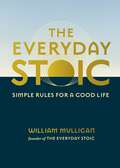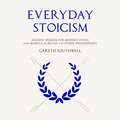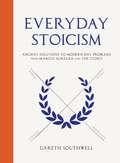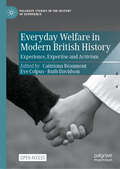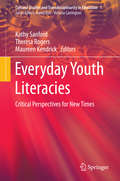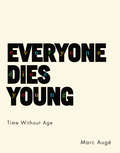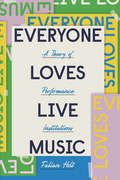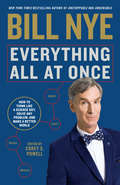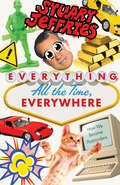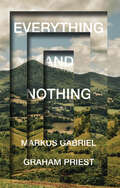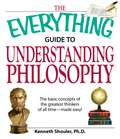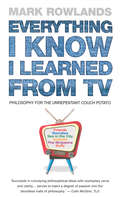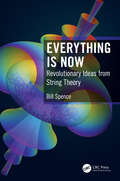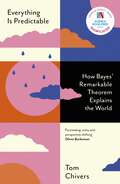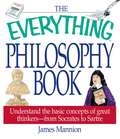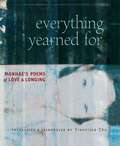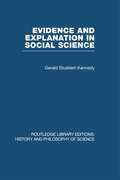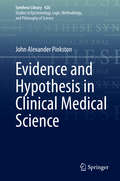- Table View
- List View
The Everyday Stoic: Simple Rules for a Good Life
by William MulliganNavigate the obstacles of contemporary life and find happiness by following in the footsteps of the classical tradition of Stoicism in this empowering and accessible book written by the founder of the popular The Everyday Stoic account. William Mulligan, founder of The Everyday Stoic, transforms principles from ancient Stoic philosophy into a contemporary guide for overcoming the challenges of modern life and cultivating an unshakeable sense of inner calm, so that you too can live like a Stoic. Rediscover ancient wisdom and join the Stoic movement: From Marcus Aurelius to Seneca, the Stoics have a long and rich history. The Everyday Stoic draws on these timeless teachings and offers a chance to be part of a growing stoic community. Inside you'll discover how to: Cultivate Resilience: With practical tips and actionable advice, this is the perfect guide for anyone looking to gain resilience and overcome adversity, no matter what modern life throws their way. Follow Simple Rules for a Good Life: Explore key concepts such as confronting life's unpredictability and how thoughts create reality, which will empower you to not only be comfortable in the face of adversity but also to thrive. Boost Your Mental Health: Taking the lessons of Stoic Philosophy and applying them to your life can have positive effects on mental health, teaching you how to transform your mindset and shift how you perceive life's obstacles. Channel Ancient Greek and Ancient Roman thoughts and teachings in this accessible, life-transforming guide to making a better, calmer, and less stressed life.
Everyday Stoicism: Ancient Solutions to Modern Day Problems from Marcus Aurelius and the Stoics
by Gareth SouthwellGrow in wisdom with this practical guide to Stoic philosophy for modern day-to-day lifeDiscover the path to a more contented, fulfilled life through the teachings of Stoic philosophers, from Marcus Aurelius to Epictetus. Learn how to build resilience, foster inner peace, and harness self-control.Stoic philosophy is not an armchair philosophy: it was designed by the ancient Greek and Roman philosophers to be used in day-to-day life, and their teachings offer a host of simple, practical ideas to maximise positivity in our lives.Tackling a key theme each month, from Happiness and Health to Money and Politics, Everyday Stoicism guides you through the calendar year to build a toolkit of simple exercises and practical ideas for how to live these values every day.So, harness the collective wisdom of the ancient Stoic philosophers today and discover the joy of everyday stoicism.
Everyday Stoicism: Ancient Solutions to Modern Day Problems from Marcus Aurelius and the Stoics
by Gareth SouthwellGrow in wisdom with this practical guide to Stoic philosophy for modern day-to-day lifeDiscover the path to a more contented, fulfilled life through the teachings of Stoic philosophers, from Marcus Aurelius to Epictetus. Learn how to build resilience, foster inner peace, and harness self-control.Stoic philosophy is not an armchair philosophy: it was designed by the ancient Greek and Roman philosophers to be used in day-to-day life, and their teachings offer a host of simple, practical ideas to maximise positivity in our lives.Tackling a key theme each month, from Happiness and Health to Money and Politics, Everyday Stoicism guides you through the calendar year to build a toolkit of simple exercises and practical ideas for how to live these values every day.So, harness the collective wisdom of the ancient Stoic philosophers today and discover the joy of everyday stoicism.
Everyday Stoicism: Ancient Solutions to Modern Day Problems from Marcus Aurelius and the Stoics
by Gareth SouthwellGrow in wisdom with this practical guide to Stoic philosophy for modern day-to-day lifeDiscover the path to a more contented, fulfilled life through the teachings of Stoic philosophers, from Marcus Aurelius to Epictetus. Learn how to build resilience, foster inner peace, and harness self-control.Stoic philosophy is not an armchair philosophy: it was designed by the ancient Greek and Roman philosophers to be used in day-to-day life, and their teachings offer a host of simple, practical ideas to maximise positivity in our lives.Tackling a key theme each month, from Happiness and Health to Money and Politics, Everyday Stoicism guides you through the calendar year to build a toolkit of simple exercises and practical ideas for how to live these values every day.So, harness the collective wisdom of the ancient Stoic philosophers today and discover the joy of everyday stoicism.
Everyday Welfare in Modern British History: Experience, Expertise and Activism (Palgrave Studies in the History of Experience)
by Caitríona Beaumont Eve Colpus Ruth DavidsonThis open access book offers a new approach to understandings of welfare in modern Britain. Foregrounding the agency individuals and groups claimed through experiential expertise, it traces deep connections between personal experience, welfare, and activism across diverse settings in modern Britain. The experiential experts studied in this collection include women, students, children, women who have sex with women, bereaved families, community groups, individuals living in poverty, adults whose status sits outside professional categories, health service users, and people of faith. Chapters trace how these groups have used their experiences to assert an expert witness status and have sought out new spaces to expand the scope, inclusivity, and applicability of welfare services.
Everyday Youth Literacies
by Kathy Sanford Theresa Rogers Maureen KendrickTestifying to the maturity of the youth literacy education field, this collection of papers displays the increasing sophistication of research on the subject, and at the same time offers pointers to its potential for development in the next decade. The contributors track the rapid proliferation of youth literacies in today's digital age, from video games to social media and film production. Drawing on detailed research and an intimate knowledge of youth communities in nations as diverse as Canada and Uganda, they provide notable examples of digital literacies in situ, and challenge conventional wisdom about literacy education. The chapters do more, however, than merely offer reportage of a crisis in literacy education. The authors embrace the core challenge faced by educators everywhere: how to incorporate and utilize new modes of literacy in education, and how to realize the potential benefits of heterogeneous modern media in youth literacy education, especially in marginalized, remote, and disadvantaged communities. This volume expands our view of digital communications technologies and digital literacies to include complex understandings of how media such as translated videos can serve as learning tools for youths whose access to literacy education is limited. In particular, a number of contributing scholars provide important new information about the praxis of teachers and the literacies adopted by young people in Africa, a continent largely neglected by literacy researchers. This book's global perspective, and its ground-level viewpoint of youth literacy practices in a variety of locations, problematizes normative assumptions about researching literacy as well as about literacy itself.
Everyone Dies Young: Time Without Age (European Perspectives: A Series in Social Thought and Cultural Criticism)
by Marc Augé"We are awash in time, savoring a few moments of it; we project ourselves into it, reinvent it, play with it; we take our time or let it slip away: it is the raw material of our imagination. Age, on the other hand, is the detailed account of the days that pass, the one-way view of the years whose total sum when set forth can stupefy us. Age wedges each of us between a date of birth that, at least in the West, we know for certain and an expiration date that, as a general rule, we would like to defer. Time is a freedom, age a constraint."Marc Augé remembers his beloved childhood cat, who seemed to grow wise with age, though her essential nature remained unchanged. He considers our belief that objects mature, when it is our perception of them that evolves over time. He wonders why public demonstrations of affection between the elderly make the young so uncomfortable and why we torture ourselves with regret at what might have been. Time can be liberating, he finds; it is a resource we can squander or relish. Yet age is a burden, bound by our personal and cultural neuroses. With an ethnologist's understanding of construct and practice, Augé isolates age from the development of consciousness, desire, and representations of the self. In bold, eye-opening strokes, he casts age as a physical marker and treats one's youthful approach to the world as the true measure of life's value.
Everyone Loves Live Music: A Theory of Performance Institutions (Big Issues in Music)
by Fabian HoltFor decades, millions of music fans have gathered every summer in parks and fields to hear their favorite bands at festivals such as Lollapalooza, Coachella, and Glastonbury. How did these and countless other festivals across the globe evolve into glamorous pop culture events, and how are they changing our relationship to music, leisure, and public culture? In Everyone Loves Live Music, Fabian Holt looks beyond the marketing hype to show how festivals and other institutions of musical performance have evolved in recent decades, as sites that were once meaningful sources of community and culture are increasingly subsumed by corporate giants. Examining a diverse range of cases across Europe and the United States, Holt upends commonly-held ideas of live music and introduces a pioneering theory of performance institutions. He explores the fascinating history of the club and the festival in San Francisco and New York, as well as a number of European cities. This book also explores the social forces shaping live music as small, independent venues become corporatized and as festivals transform to promote mainstream Anglophone culture and its consumerist trappings. The book further provides insight into the broader relationship between culture and community in the twenty-first century. An engaging read for fans, industry professionals, and scholars alike, Everyone Loves Live Music reveals how our contemporary enthusiasm for live music is more fraught than we would like to think.
Everyone Loves Live Music: A Theory of Performance Institutions (Big Issues in Music)
by Fabian HoltFor decades, millions of music fans have gathered every summer in parks and fields to hear their favorite bands at festivals such as Lollapalooza, Coachella, and Glastonbury. How did these and countless other festivals across the globe evolve into glamorous pop culture events, and how are they changing our relationship to music, leisure, and public culture? In Everyone Loves Live Music, Fabian Holt looks beyond the marketing hype to show how festivals and other institutions of musical performance have evolved in recent decades, as sites that were once meaningful sources of community and culture are increasingly subsumed by corporate giants. Examining a diverse range of cases across Europe and the United States, Holt upends commonly-held ideas of live music and introduces a pioneering theory of performance institutions. He explores the fascinating history of the club and the festival in San Francisco and New York, as well as a number of European cities. This book also explores the social forces shaping live music as small, independent venues become corporatized and as festivals transform to promote mainstream Anglophone culture and its consumerist trappings. The book further provides insight into the broader relationship between culture and community in the twenty-first century. An engaging read for fans, industry professionals, and scholars alike, Everyone Loves Live Music reveals how our contemporary enthusiasm for live music is more fraught than we would like to think.
Everyone Loves Live Music: A Theory of Performance Institutions (Big Issues in Music)
by Fabian HoltFor decades, millions of music fans have gathered every summer in parks and fields to hear their favorite bands at festivals such as Lollapalooza, Coachella, and Glastonbury. How did these and countless other festivals across the globe evolve into glamorous pop culture events, and how are they changing our relationship to music, leisure, and public culture? In Everyone Loves Live Music, Fabian Holt looks beyond the marketing hype to show how festivals and other institutions of musical performance have evolved in recent decades, as sites that were once meaningful sources of community and culture are increasingly subsumed by corporate giants. Examining a diverse range of cases across Europe and the United States, Holt upends commonly-held ideas of live music and introduces a pioneering theory of performance institutions. He explores the fascinating history of the club and the festival in San Francisco and New York, as well as a number of European cities. This book also explores the social forces shaping live music as small, independent venues become corporatized and as festivals transform to promote mainstream Anglophone culture and its consumerist trappings. The book further provides insight into the broader relationship between culture and community in the twenty-first century. An engaging read for fans, industry professionals, and scholars alike, Everyone Loves Live Music reveals how our contemporary enthusiasm for live music is more fraught than we would like to think.
Everything All at Once: How to Unleash Your Inner Nerd, Tap into Radical Curiosity, and Solve Any Problem
by Corey S. Powell Bill NyeIn the New York Times bestseller Everything All at Once, Bill Nye shows you how thinking like a nerd is the key to changing yourself and the world around you. Everyone has an inner nerd just waiting to be awakened by the right passion. In Everything All at Once, Bill Nye will help you find yours. With his call to arms, he wants you to examine every detail of the most difficult problems that look unsolvable—that is, until you find the solution. Bill shows you how to develop critical thinking skills and create change, using his “everything all at once” approach that leaves no stone unturned. Whether addressing climate change, the future of our society as a whole, or personal success, or stripping away the mystery of fire walking, there are certain strategies that get results: looking at the world with relentless curiosity, being driven by a desire for a better future, and being willing to take the actions needed to make change happen. He shares how he came to create this approach—starting with his Boy Scout training (it turns out that a practical understanding of science and engineering is immensely helpful in a capsizing canoe) and moving through the lessons he learned as a full-time engineer at Boeing, a stand-up comedian, CEO of The Planetary Society, and, of course, as Bill Nye The Science Guy. This is the story of how Bill Nye became Bill Nye and how he became a champion of change and an advocate of science. It’s how he became The Science Guy. Bill teaches us that we have the power to make real change. Join him in... dare we say it... changing the world.
Everything, All the Time, Everywhere: How We Became Postmodern
by Stuart JeffriesA radical new history of a dangerous ideaPost-Modernity is the creative destruction that has shattered our present times into fragments. It dynamited modernism which had dominated the western world for most of the 20th century. Post-modernism stood for everything modernism rejected: fun, exuberance, irresponsibility. But beneath its glitzy surface, post-modernism had a dirty secret: it was the fig leaf for a rapacious new kind of capitalism. It was also the forcing ground of the 'post truth', by means of which western values got turned upside down.But where do these ideas come from and how have they impacted on the world? In his brilliant history of a dangerous idea, Stuart Jeffries tells a narrative that starts in the early 1970s and continue to today. He tells this history through a riotous gallery that includes David Bowie, the Ipod, Frederic Jameson, the demolition of Pruit-Igoe, Madonna, Post-Fordism, Jeff Koon's 'Rabbit', Deleuze and Guattari, the Nixon Shock, The Bowery series, Judith Butler, Las Vegas, Margaret Thatcher, Grand Master Flash, I Love Dick, the RAND Corporation, the Sex Pistols, Princess Diana, the Musee D'Orsay, Grand Theft Auto, Perry Anderson, Netflix, 9/11We are today scarcely capable of conceiving politics as a communal activity because we have become habituated to being consumers rather than citizens. Politicians treat us as consumers to whom they must deliver. Can we do anything else than suffer from buyer's remorse?
Everything and Nothing
by Graham Priest Markus GabrielIs it possible for reality as a whole to be part of itself? Can the world appear within itself without thereby undermining the consistency of our thought and knowledge-claims concerning more local matters of fact? This is a question on which Markus Gabriel and Graham Priest disagree. Gabriel argues that the world cannot exist precisely because it is understood to be an absolutely totality. Priest responds by developing a special form of mereology according to which reality is a single all-encompassing whole, everything, which counts itself among its denizens. Their disagreement results in a debate about everything and nothing: Gabriel argues that we experience nothingness once we overcome our urge to contain reality in an all-encompassing thought, whereas Priest develops an account of nothing according to which it is the ground of absolutely everything. A debate about everything and nothing, but also a reflection on the very possibility of metaphysics.
The Everything Guide to Understanding Philosophy (The Everything®)
by Kenneth ShoulerComplex ideas explained in everyday language!Is there life after death? Are euthanasia, suicide, or stem cell research ethical acts? Does the use of performance enhancers in sports constitute cheating?These are the types of philosophical questions people face today. Philosophy is not a dead set of doctrines--it's a living body of knowledge that you can use to guide behavior and problem solving. In a lively, easy-to-follow approach, The Everything Guide to Understanding Philosophy introduces you to the major thinkers and the problems they've pondered over the last 2,600 years.In plain English, author Kenneth Shouler, Ph.D. explains all of the great philosophies--and provides contemporary examples to put them in perspective. He delves into the minds of such philosophers as:Socrates, Plato, and AristotleAugustine and AquinasSpinoza and DescartesLocke and HumeMill and NietzscheRussell and SartreIf you're ready to broaden your outlook on life, this is the book for you. Endlessly fascinating--and always clear and concise--it's the perfect introduction for budding philosophers!
Everything I Know I Learned From TV: Philosophy For the Unrepentant Couch Potato
by Mark RowlandsEverything I Know I Learned From TV uses characters we all know and love and their TV worlds to explain the great questions of philosophy. The only qualifications you need to join in are ownership of a sofa, a remote control, a sense of humour and an enquiring mind. The philosophy discussed is very much 'life' philosophy, answering the questions we all want to know: How do you define what is a good life to lead? The Simpsons disagree over the right way to live with Nietzsche and Diogenes on hand to take sides. What is real happiness? Aristotle fights Descartes for the heart and mind of Sex and the City's Carrie Bradshaw. Can a good person do a bad thing? Kant and Socrates pay a call on Tony Soprano and his latter-day Mob to talk moral philosophy. Where does love end and friendship begin? Rachel and Ross ask Plato about the philosophy of emotions and wonder if they're just good friends. Is the pursuit of self-knowledge a good thing? Socrates helps Niles and Frasier Crane and their dad deal with the relative merit of the examined and the unexamined life. And much more.
Everything is Now: Revolutionary Ideas from String Theory
by Bill SpenceThis engaging and beautifully written book gives an authoritative but accessible account of some of the most exciting and unexpected recent developments in theoretical physics. – Professor Lionel J Mason, Mathematical Institute, University of Oxford String theory is often paraded as a theory of everything, but there are a large number of untold stories in which string theory gives us insight into other areas of physics. Here, Bill Spence does an excellent job of explaining the deep connections between string theory, particle physics, and the novel way of viewing space and time. – Professor David Tong, Department of Applied Mathematics and Theoretical Physics, University of Cambridge Foremost amongst Nature’s closest-guarded secrets is how to unite Einstein’s theory of gravity with quantum theory – thereby creating a ‘quantum space-time’. This problem has been unsolved now for more than a century, with the standard methods of physics making little headway. It is clear that much more radical ideas are needed, and our front-line researchers are showing that string theory provides these. This book describes these extraordinary developments, which are helping us to think in entirely new ways about how physical reality may be structured at its deepest level. Amongst these ideas are that Everything can happen at the same time – it is all Now; Hidden spaces, large and small, are everywhere amongst us; The basic objects are ‘membranes’ that behave like soap bubbles and can explore the shape of spacetime in new ways; We are holographic projections from higher dimensions; You can take the ‘square root’ of gravity; Ideas from the ancient Greeks are resurfacing in a beautiful new form; And the very latest work shows that ‘staying positive’ is essential. The book is aimed at a general audience, using analogies, diagrams, and simple examples throughout. It is intended as a brief tour, enabling the reader to become aware of the main ideas and recent work. A full list of further resources is supplied. Bill Spence is the founding Director of the Centre for Research in String Theory at Queen Mary University of London. He has worked on string theory for over three decades.
Everything Is Predictable: How Bayes' Remarkable Theorem Explains the World
by Tom ChiversThomas Bayes was an eighteenth-century Presbyterian minister and amateur mathematician whose obscure life belied the profound impact of his work. Like most research into probability at the time, his theorem was mainly seen as relevant to games of chance, like dice and cards. But its implications soon became clear. Bayes' theorem helps explain why highly accurate screening tests can lead to false positives, causing unnecessary anxiety for patients. A failure to account for it in court has put innocent people in jail. But its influence goes far beyond practical applications. A cornerstone of rational thought, Bayesian principles are used in modelling and forecasting. 'Superforecasters', a group of expert predictors who outperform CIA analysts, use a Bayesian approach. And many argue that Bayes' theorem is not just a useful tool, but a description of almost everything - that it is the underlying architecture of rationality, and of the human brain. Fusing biography, razor-sharp science communication and intellectual history, Everything Is Predictable is a captivating tour of Bayes' theorem and its impact on modern life. From medical testing to artificial intelligence, Tom Chivers shows how a single compelling idea can have far-reaching consequences.
The Everything Philosophy Book: Understand the Basic Concepts of Great Thinkers—from Socrates to Satre (Everything® Series)
by James MannionAt last, you can grasp the most difficult concepts of thought!If you&’ve always wanted to learn about philosophy but were too intimidated to get past the first word ending in &“ism,&” The Everything Philosophy Book provides simple explanations guaranteed to make philosophic ideas and concepts easy to understand. This entertaining book offers a broad overview of many diverse schools of thought—from antiquity up through the present day. In plain English, author James Mannion explains all of the great philosophies—and even provides contemporary examples to put them in perspective. Interspersed are fascinating sidebars that offer helpful hints toward understanding complex concepts and little-known facts about the lives of great philosophers. The Everything Philosophy Book delves into the minds of such philosophers as: -Socrates, Plato, and Aristotle -Augustine and Aquinas -Buddha and Confucius -Spinoza and Descartes -Locke and Hume -Voltaire and Rousseau -Mill and Nietzsche -Russell and Sartre Endlessly fascinating—and always clear and concise—The Everything Philosophy Book will be welcomed by anyone who wants to broaden his or her outlook on life.
Everything Yearned For
by David R Mccann Francisca ChoManhae (1879-1944), or Han Yongun, was a Korean Buddhist (Son) monk during the era of Japanese colonial occupation (1910-1945). Manhae is a political and cultural hero in Korea, and his works are studied by college students and school children alike. Everything Yearned For is a collection of 88 love poems, evocative of the mystical love poetry of Rumi, and even reminiscent of the work of Pablo Neruda.Though Manahe's poetry can be read allegorically on many levels - political and religious - it is completely unlike any other poetry in Buddhist or secular realm. The first poem, "My Lover's Silence," narrates the lover's departure and establishes the enduring themes of the work: the happiness of meeting, the sadness of separation, the agony of longing and waiting, and, most of all, the perfection of love in absence that demands the cost of one's ongoing life, as opposed to the relief of death. The Korean word translated in these poems as "love" and "lover" is nim, though nim has many and broad interpretations. Understandably, the identity of Manhae's lover, or "nim" has been the subject of much speculation. Manhae writes in his own preface: "Nim" is not only a human lover but everything yearned for. All beings are nim for the Buddha, and philosophy is the nim of Kant. The spring rain is nim for the rose, and Italy is the nim of Mazzini. Nim is what I love, but it also loves me. If romantic love is freedom, then so is my nim. But aren't you attached to the lofty name of freedom? Don't you also have a nim? If so, it's only your shadow. I write these poems for the young lambs wandering lost on the road home from the darkening plains.
The Everything Zen (The Everything®)
by Jacky SachDo you find yourself restless and distracted by the hustle and bustle of the modern world? Have you sought comfort in possessions and acclaim only to be disappointed by their emptiness? If so, you are not along. The Everything Zen Book introduces you to thousands of years of ancient teachings that can help you achieve inner peace and unity with the world around you. Whether you are at home or in the office, this easy-to-follow guide shows you how to apply ancient Zen principles to every area of your life—from relationships and your career to artistic expression and your health.
Evicitionism: The compromise solution to the pro-life pro-choice debate controversy
by Walter E. BlockThis book applies libertarian property rights theory to a vexing controversy, abortion. This book offers a compromise solution that will not fully please either of the two sides of this debate, but, is the only possible reconciliation between the two. Nor are its benefits limited to the fact that the opposing forces in this debate may be brought together. Evictionism, also, is the only philosophical position compatible with human rights; neither of the other two can make this claim.There are many other publications and learned articles supporting the pro-life position as well as defending the pro-life viewpoint. This is the only book that offers a perspective on abortion that is radically different than both. This book uniquely applies private property rights theories we all agree upon when referred to issues such as real estate, crime, torts, etc., to abortion. The underlying philosophical contribution of Evictionism this book presents is that these basic legal premises can be utilized in this controversial case as well as practically everywhere else in law.Want to solve the abortion controversy? Want to demonstrate that both the pro-life and the pro-choice positions are erroneous? Want to read about a position that is a compromise between the pro-life and the pro-choice positions? Then this book provides robust understanding, discussions and applications for getting to the truth about this issue.
Evidence and Evolution
by Elliott SoberHow should the concept of evidence be understood? And how does the concept of evidence apply to the controversy about creationism as well as to work in evolutionary biology about natural selection and common ancestry? In this rich and wide-ranging book, Elliott Sober investigates general questions about probability and evidence and shows how the answers he develops to those questions apply to the specifics of evolutionary biology. Drawing on a set of fascinating examples, he analyzes whether claims about intelligent design are untestable; whether they are discredited by the fact that many adaptations are imperfect; how evidence bears on whether present species trace back to common ancestors; how hypotheses about natural selection can be tested, and many other issues. His book will interest all readers who want to understand philosophical questions about evidence and evolution, as they arise both in Darwin's work and in contemporary biological research.
Evidence and Explanation in Social Science: An Inter-disciplinary Approach (Routledge Library Editions: History & Philosophy of Science)
by Gerald Studdert-KennedyOriginally published in 1975. The main concern of this book is the nature of the gap between the theoretical issues, raised at an abstract level by social scientists, and their facts, the material organized in an empirical analysis. The author draws on material from several disciplines to explore the contributions of social science theory to historical insight.
Evidence and Faith
by Charles TaliaferroCharles Taliaferro has written a dynamic narrative history of philosophical reflection on religion from the seventeenth century to the present, with an emphasis on shifting views of faith and the nature of evidence. The book begins with the movement called Cambridge Platonism, which formed a bridge between the ancient and medieval worlds and early modern philosophy. While the book provides a general overview of different movements in philosophy, it also offers a detailed exposition and reflection on key arguments. The scope is broad, from Descartes to contemporary feminist philosophy of religion. Written with clarity and verve, this is a book that will appeal to professionals and students in the philosophy of religion, religious studies, and the history of ideas, as well as informed lay readers.
Evidence and Hypothesis in Clinical Medical Science (Synthese Library #426)
by John Alexander PinkstonIn this book, the author argues that no current philosophical theory of evidence in clinical medical science is adequate. None can accurately explain the way evidence is gathered and used to confirm hypotheses. To correct this, he proposes a new approach called the weight of evidence account. This innovative method supplies a satisfactory explanation and rationale for the “hierarchical pyramid” of evidence–based medicine, with randomized clinical trials and their derivatives, meta-analyses, and systematic reviews of randomized clinical trials at the top and case reports, case series, expert opinion, and the like at the bottom. The author illustrates the development of various “levels” of evidence by considering the evolution of less invasive surgical treatments for early breast cancer. He shows that the weight of evidence account explains the notion of levels of evidence and other efforts to rank them. In addition, he presents a defense of randomization as a method to maximize accuracy in the conduct of clinical trials. The title also considers ethical issues surrounding experimentation with medical therapies in human subjects. It illustrates and discusses these issues in studies of respiratory therapies in neonates and treatment for certain cancers in adults. The author shows that in many cases sufficient evidence can be accrued to warrant generally accepted new therapies without the need for evidence derived from randomized clinical trials.
